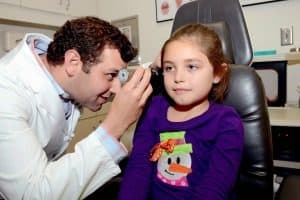Often referred to as a “more powerful hearing aid” or “bionic ear,” cochlear implants have given those with severe hearing loss the gift of a renewed sense of sound. While not everybody is a candidate for the procedure, it has certainly provided a breakthrough in medicine, especially for those who have benefitted from gaining their sense of hearing back. Cochlear implants have come a long way in terms of technology, and the team at Pediatric ENT Associates in Birmingham, AL is at the forefront of the latest innovations.
History Of Cochlear Implants
Cochlear implants may have only been made available during the 1980s, but the concept of utilizing electrical instead of acoustic stimulation to activate the auditory system in those with profound hearing loss is not a novel idea. Here’s a timeline showing how cochlear implants came about:
1800 – Famous physicist, chemist, and pioneer of electrical science Alessandro Volta reported that electrical stimulation to metal rods inserted in the ear canal created an auditory sensation.
1957 – André Djourno (professor of medical physics) and Charles Eyrie (Parisian otologist) performed the first direct electrical stimulation of the human auditory system.
1961 – Dr. William House (otologist) teamed with Dr. John Doyle (neurosurgeon) to implant the first patients in Los Angeles. Results obtained showed that the patients had some basic frequency discrimination and could identify words in small closed sets.
1972 – It took House ten years to develop and introduce the first single-channel device (3M/House device). Over 1000 patients were implanted from 1972 to the mid-1980s, including several hundred children. This device was well tolerated and provided many users with significant speechreading enhancement.
1984 – Cochlear Corporation introduced the first multi-channel cochlear implant system. The Nucleus 22 consisted of an implanted receiver/stimulator and an intracochlear electrode array that was comprised of 22 banded contacts. And progressively, the company developed more innovative versions of the Nucleus device over the next several years.
1990 – The FDA approved the multichannel cochlear implant (Nucleus Cochlear Implant system) for pediatric use, specifically for children aged 2-17 years.
2000 – The FDA approved implanting children at 12 months old.
Benefits Of Cochlear Implants vs Other Options
Cochlear implants should not be viewed solely as a miracle cure. A healthier perspective would be looking at it as a neutral tool whose value relies on the skill and diligence of its user –because it takes effort to maximize its advantages. But with time and proper training, those with cochlear implants can get the most out of their new implants and a chance to finally hear the world. More importantly, those with cochlear implants will not only have a better ability to connect with others but can also live full lives. These are the other benefits of cochlear implants:
- Improvement in Hearing and Speech Perception – Those with cochlear implants demonstrate improvement in sound detection and in their auditory perception skills. While hearing through an implant may sound different from normal hearing, it still allows many users to communicate fully through oral communication, whether in person or over the phone.
- Progress in Speech Development – Early cochlear implantation (around 12-18 months) is especially beneficial for prelingual deaf children, as hearing plays a significant role in language development. Cochlear implants help improve the clarity of a child’s speech, as well as the development of listening and spoken language skills. This increases the child’s chance of following the general education system.
- Safety and Awareness – Cochlear implants allow users to hear potential dangers or emergency alerts such as alarms and sirens.
- Increase in Career Opportunities – Since children with cochlear implants have a greater ability to enter the general education system, they have more opportunities for advancement, opening doors to more career options in the future.
Trust the experts in Pediatric ENT
From obstructive sleep apnea to hearing loss, our physicians at Pediatric ENT Associates in Birmingham have the experience and expertise necessary to accurately diagnose your child’s condition and create an individualized treatment plan for your child. Our group of experienced doctors specializes in providing the most advanced care for children requiring cochlear implants. In addition, the Pediatric ENT Associates physicians are active members in interdepartmental programs at Children’s of Alabama, providing a comprehensive and thorough approach to your child’s care. If you need further information about this device, you can review this article on https://www.nidcd.nih.gov/.
Schedule A Cochlear Implant Consultation with an ENT Specialist in Birmingham Today
Cochlear implants can help very young children develop speech and language abilities that are almost on par with their fully hearing peers. If you feel that your child may benefit from this cutting-edge assistive technology, please contact Pediatric ENT Associates today. World-renowned pediatric ENT specialist Dr. Audie Woolley heads the cochlear implant program in Birmingham Alabama and will take the time to evaluate your child and explain everything that the process involves.


